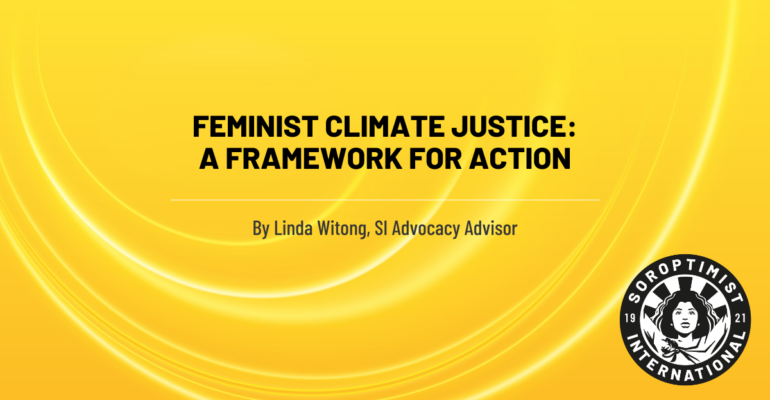Blog of Linda Witong, SI Advocacy Advisor.
In this blog on Earth Day 2024, Soroptimist International Advocacy Advisor Linda Witong delves into the intersections of climate crises and gender inequality, drawing from a recent and significant report by UN Women. The report, titled ‘Feminist Climate Justice: A Framework for Action’, illuminates how existing gender disparities exacerbate environmental breakdowns and offers crucial guidance for policymakers and individuals.
Feminist Climate Justice
A report entitled Feminist Climate Justice: A Framework for Action” A Conceptual framework prepared for Progress of the World’s Women series was recently released by the UN Women. It uses a gender lens to explain how the factors which are leading to the climate and environmental breakdown are also the same structural factors behind existing gender inequalities. It also and provides guidance to women, girls, gender-diverse people and policymakers on what needs to happen and how all of us can support its monitoring and implementation.
The report begins by discussing the increase in climate disasters which continue to break records across the globe causing flooding, drought, wildfires, food shortages, health problems and major damage to ecosystem functions and human habitats while the government ambitions fail to match the urgency of the moment. The report also describes how a growing body of evidence on gender and climate change has identified negative impacts across a range of economic and social outcomes for women, girls and gender-diverse people due to underlying gender inequalities and the failure to take gender issues into account in environmental policymaking.
This failure has resulted in the number of climate-related disasters nearly doubling in 20 years and making women and girls even more vulnerable to disasters, in terms of both the immediate impacts as well as their capacity to recover in the aftermath, because of gender inequalities. Without action to halt climate change, the world’s women and girls now face wholesale reversal of their human rights and, by the mid-century, a series of other crises including extreme economic inequalities, a crisis of care, a crisis of racialized violence and dispossession, a crisis of democracy and an upsurge in violence and protracted conflict may also push up to 158 million more women and girls into poverty. (16 million more than the total number of men and boys.)
When all was said and done, the conclusion was that we were facing a ‘epochal crisis’ with pervasive and mutually reinforcing effects that are accelerating the real threat of climate change while simultaneously undermining the political conditions needed to address it. The global community can longer continue “tinkering around the edges”. It must transform every part of the world’s economies and societies using a feminist climate justice policy framework as a roadmap of where the world needs to go in this critical moment. Moreover, the leadership and agency of women and gender- diverse people are also seen as crucial to adapting and driving the change that is so urgently needed.
Conclusion
In conclusion, the imperative for feminist climate justice, as detailed by Linda, highlights a key urgency of our time – particularly as we mark Earth Day, it is important we listen to calls to recognise the intersectionality of the climate crisis and gender inequality. By embracing a transformative agenda that prioritises the leadership and agency of women and gender-diverse individuals, we can navigate the path toward a sustainable and equitable future for all.

